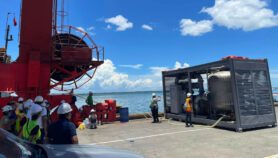Send to a friend
The details you provide on this page will not be used to send unsolicited email, and will not be sold to a 3rd party. See privacy policy.
[BUENOS AIRES] A ten-year strategy to strengthen and guide nanotechnology research and development in Argentina was proposed this month by the Argentinean congress's technology commission.
The proposal was presented on 10 June in a parliamentary bill and will be debated in the coming weeks. It is intended to clear up confusion created by the launch on 29 April of the Argentinean Nanotechnology Foundation.
The foundation was created by presidential decree, and thus did not need the approval of congress. But by creating a source of research funding, the decree sidestepped a law requiring all scientific activities to be coordinated by the National Agency for the Promotion of Scientific, Technological and Productive Innovation.
Launching the foundation, the Argentinean finance minister Robert Lavagna said the Treasury would invest US$10 million in it (see Argentina invests US$10 million in nanotechnology).
He added that the US company Lucent Technologies would develop any products arising from the research funded, because Argentina lacks the resources to do so.
Lilia Puig de Stubrin, who heads the congress's technology commission, contested this plan in parliament on 13 May (see 'Suspicion' over Argentinean funds for nanotechnology).
She said it was neither clear from which budget the funding would be secured, nor what guidelines had been used to elect the foundation's board members, which include two employees of Lucent Technologies.
She also asked why the Secretariat of Science and Technology had not been consulted.
With the new bill, Puig de Stubrin's commission aims to revoke the presidential decree and obtain a parliamentary consensus on Argentina's strategy for nanotechnology research.
Puig de Stubrin told SciDev.Net that the foundation should be abandoned and replaced with a fund administered by the National Agency for the Promotion of Scientific, Technological and Productive Innovation, and headed by representatives of the Ministry of Economy and of Education, Science and Technology.
In addition to creating a fund, the strategy proposed by Puig de Stubrin would develop policies for the next ten years focusing on key nanotechnologies that could help the country. It would also build local capacity for nanotechnology and encourage research collaborations with scientists in Brazil and Europe.
"We think the Treasury had good intentions, but did things the wrong way," she said. "We understand that the government must react quickly and embrace nanotechnology, as the country is late on this, but this must be done in a careful manner."
"For example, it is not clear why Lucent Technologies was chosen over other companies, foreign or national. We want to start a public debate over this, so that all the experts can join us and give us their opinion, and at the same time build a medium term plan with very clear goals for our country."
No spokesperson at the Treasury could be reached at the time of writing.
Bill proposing a national strategic plan for the development of micro and nano technologies (in Spanish)
Read more about nanotechnology in SciDev.Net's nanotechnology quick guide.













